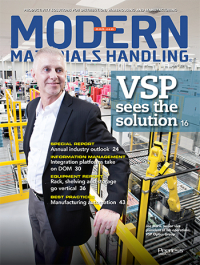Lift Truck Tips: Are operators and lift trucks truly working together?
Optimal fleet management is only possible when those responsible for operators and assets are on the same page.
Latest Material Handling News
Overlooked no more: The importance of lift truck inspections Lithium transition: It’s all about the outcomes Safety for automatic guided vehicle (AGV) environments Assessing the move to lithium Leasing’s fleet management upside More Lift Truck TipsThe proliferation of fleet management technologies has helped lift truck fleet managers quantify and control costs that previously slipped under the radar. However, telematics and data collection practices still struggle to measure and improve operator culture, which can have a significant impact on costs and productivity. Jim Gaskell, director of global technology business development for Crown Equipment, says optimal fleet management consists of two main elements: the operator and the asset.
“If you have a really good maintenance plan and no control over operators, you don’t have a very good maintenance program,” he says. “Your maintenance department is there to just dump money into a lift truck.”
Gaskell has seen plenty of customers with an average operator tenure of close to 20 years, where the culture is such that it drives good behavior within a solid safety program. The way an operator treats an asset has a lot to do with its reliability, he says, and these cultures create a positive feedback loop for overall fleet costs. But, for any company, Gaskell says, all they know is what they witness.
“A manager will say whenever he goes through the warehouse he hears lift truck horns honking, but if someone without a tie walks through, are there still as many horns?” Gaskell asks. “If a horn honks in an empty warehouse, does anyone hear it?”
Some might assign a monitor to follow operators around and jot down every time they honk the horn, but the operator still knows he’s being watched. Gaskell says studies have shown many operators are around 50% compliant when it comes to sounding horns, coming to a complete stop, and obeying speed limits.
“With that data, the next step is to create a process that helps take advantage of that new learning,” Gaskell says. “Fleet management technologies will reveal the most abusive operators quickly. The big question is how to get them to stop. If you can, right off the bat you could see an operating cost reduction of 5% to 10%. Over time, abuse prevention can increase that figure to 30%. Telematics enables you to get there sooner, since it identifies the problem, but then you have to manage it.”
This is also a team effort between operations and maintenance. When trying to sell a fleet management solution, Gaskell says companies often have two separate audiences: the maintenance department, which is looking for something to record all repair orders; and a management system to track service and parts. The piece they don’t control is abuse, at which point it’s ideal to bring in someone with that responsibility.
“The people driving the equipment and those fixing it want to work together,” Gaskell adds. “If you go and talk to the supervisor in charge of operators they will say their No. 1 job is to get product out the door. Of course they want to do that safely, but how can they prove they aren’t? How safe do you really think you are, and what is that belief based on? Your gut or analytics?”

Article Topics
Lift Truck Tips News & Resources
Overlooked no more: The importance of lift truck inspections Lithium transition: It’s all about the outcomes Safety for automatic guided vehicle (AGV) environments Assessing the move to lithium Leasing’s fleet management upside Managing for lift truck operator safety Narrow aisle success: Think systems, then trucks More Lift Truck TipsLatest in Materials Handling
Beckhoff USA opens new office in Austin, Texas Manhattan Associates selects TeamViewer as partner for warehouse vision picking ASME Foundation wins grant for technical workforce development The (Not So) Secret Weapons: How Key Cabinets and Asset Management Lockers Are Changing Supply Chain Operations MODEX C-Suite Interview with Harold Vanasse: The perfect blend of automation and sustainability Consultant and industry leader John M. Hill passes on at age 86 Registration open for Pack Expo International 2024 More Materials HandlingAbout the Author
Subscribe to Materials Handling Magazine

Find out what the world's most innovative companies are doing to improve productivity in their plants and distribution centers.
Start your FREE subscription today.
April 2024 Modern Materials Handling

Latest Resources











